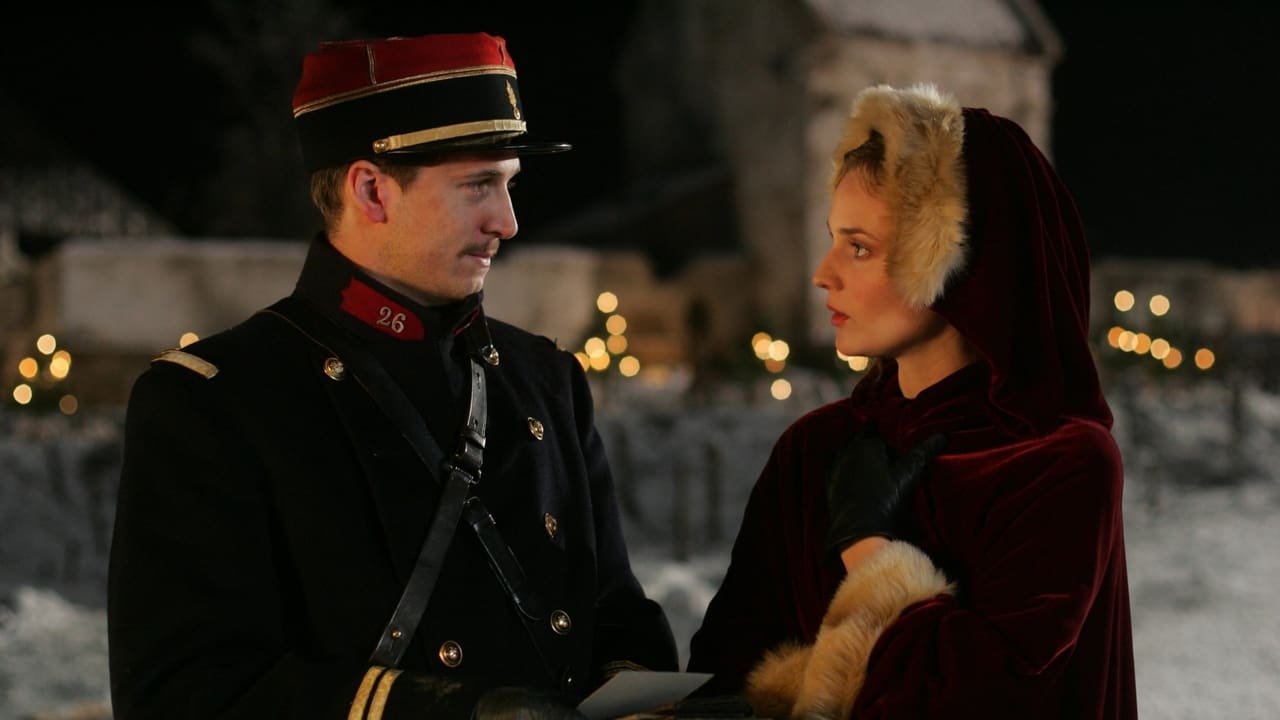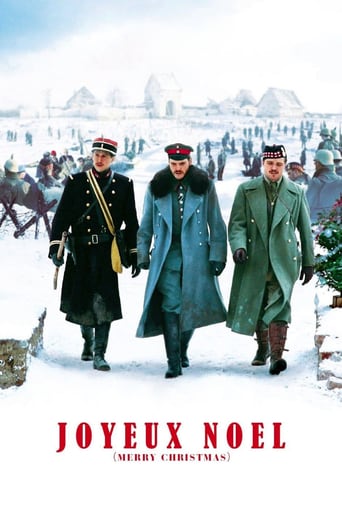Intcatinfo
A Masterpiece!
Ava-Grace Willis
Story: It's very simple but honestly that is fine.
Cody
One of the best movies of the year! Incredible from the beginning to the end.
Staci Frederick
Blistering performances.
cricketbat
Joyeux Noel is a film that beautifully balances the horrors of war with the spirit of Christmas. What makes this heart-warming tale even more fascinating is that it is based on actual events during the first World War. It is well-made, well-acted and well-executed. I'm glad I got to see this film.
ThatMOVIENut
A recreation of the infamous WW1 event, 'Noel' deals with the extraordinary circumstance when, during the first year of The Great War, French, German and Scots laid down arms and celebrated Christmas Eve and Day together, sharing gifts, singing hymns and playing football. Stereotypes and barriers are broken down, and the soldiers begin to see each other as more than just 'the enemy'.A unique war film, 'Joyeux Noel' is more about the human capacity for forgiveness and understanding even in the face of such paramount horror and radical nationalism. It accomplishes via having several aces up its sleeve. First, it boasts a fine range of European talent, including the likes of a young Daniel Bruhl, Diane Kruger, Guillame Canet, Benno Furmann, Gary Lewis and especially, Danny Boon. Sort of the French Sandler/Williams, Boon is a comic actor who proves his dramatic chops here, playing the French Lieutenant's aide/barber. He's sort of a lovable manchild who brings a sort of rural heartiness to the trenches, like having his coffee at 10 every morning to remind him of his mother. In any other film, this could've been obnoxious, but Boon walks the line aptly and the film's careful spreading of humour make it quite charming.On top of this, we also have a moving but sparse choral-centric score, fitting the yuletide setting, and rather convincing recreations of the tight, filthy trench life and the desolation of No Man's Land. It may not be overly gritty or gory, but it still conveys the impression of a place you don't want to be in. As far as negatives go, I have not much to say really. Maybe the superior officers are a little one note 'this is most unorthodox!', but the story's not focused on them, so it's not a big issue. Honestly, what's good here is really good, and makes for one of the most different and best Xmas films out there.
n-mo
Christian Carion is not a prolific filmmaker, but the efforts he does make are noble and display, for the most part, a high level of technical directorial competence despite his relative inexperience. There are of course a few flaws, in this case the hamminess of Diane Kruger and especially Benno Fürmann in two of the lead roles. But although each *part* is made with loving care, on the whole his films seem to lack any sort of grandiose vision or context.Having met and talked (briefly) with Carion my impression is that he is a very kind and very humble man with an earnest desire to see good triumph both in life and on film yet a healthy degree of skepticism as to the capacity of this world to "work things out." I also suspect, however, that he is something of a perfectionist and not perhaps wholly self-confident: there are moments in his films, such as this one, which appear artificial and overly-polished.And I think part of this stems from the fact that Carion tries earnestly to work in a context that he does not fully understand. In the case of Joyeux Noël, Carion tries and unfortunately fails - though his is a much noble failure than that of Jean-Pierre Jeunet in the deliberately commercial "A Very Long Engagement" - to capture the spirit and atmosphere of 1910s Europe. He fails - but he deserves credit for nearly succeeding. Other contemporary filmmakers would have taken the subject of the Christmas Truce and created a banal lesson about top-down bureaucratic WORLD PEACE that would make Eleanor Roosevelt proud. Carion does not succumb to the temptation to do so.Nor does Carion - who was apparently a "seeking" nonbeliever when I met him in 2006 - neglect to amply depict - as James Cameron neglected to do in "Titanic" - the still ubiquitous presence of Christian belief, ritual and cultural referential in the Western society of that time. However, he fails to bind this Christian culture and energy to the characters, and in so doing he fails to provide an important aspect of the context in which the historical Christmas Truce took place: the common religious, ethical and cultural referentials were still strong enough to provide, if only for a moment, a solid covering of chivalry.Not that he doesn't try. Hints are given as to the respective family and parochial lives of the major characters from respectively Scotland, France and Germany, but not nearly enough. Carion doesn't seem comfortable trying to flesh these out more: if he is trying to respect the rule that a writer should stick to writing what he knows, then the film is better off for it. Regrettably, though, the dearth of cultural context means that anyone not already deeply initiated in European history and the Christmas Truce - or even, after a few successive viewings, someone who is - will find that the film seems... small, much smaller and less significant than its subject matter. This WAS, after all, the "War to End Wars," and the truce involved hundreds of thousands of troops along the trenches. Yet Carion never expands outward from the cannon-fodder layer of wartime society - a Christmas Peace had been requested by Pope Benedict XV and rebuffed by the military commanders - and so we never get a sense of the drama or the moral significance of the events.I would say that "Joyeux Noël" is on the whole a failure, but it is a noble failure, one that should provide hints for a jumping off point when somewhere down the road someone decides to paint a more grandiose picture of this under-appreciated happening. But if such an honest and tasteful filmmaker as Carion cannot penetrate deeply enough into the more primordial imagination of the period to portray it more fully, it is questionable whether a truly satisfying and earnest portrayal of the Peace can ever be realized in the modern world.
oscar-35
*Spoiler/plot- 2005, Christmas Eve 1914 on a WW1 battlefield a momentous event changed the lives of soldiers from France, Germany, and England (Scotland). An Oscar nominated film tells the true-life story of the spontaneous Christmas Eve truce declared by Scottish, French, and German trench troops in WW1. The enemies leave their weapons behind for one night as they band together in brotherhood and forget about the brutalities and military discipline of war.*Special Stars- Diana Kruger, Daniel Bruht, Benno Furmann *Theme- Hollywood film business is a crazy impressionable system.*Trivia/location/goofs- The History Channel did an extensive documentary on this mystical event. This fictional narrative adds more attractive trivia to the real event. The voice singing of the two German characters is stunning; were they dubbed or not? They were DUBBED.*Emotion- An enjoyable film. A must see and powerful film of a real startling wartime event commemorated even today yearly in Belgium on the very spot it occurred.

